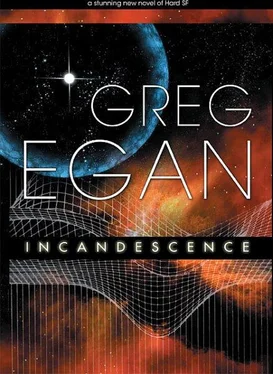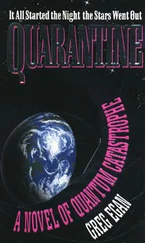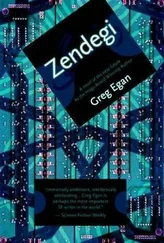"Is there anything to keep us here?" he wondered. They had already built a communications link that would allow the telescope to convey any further discoveries to Lahl's Promise; before departing they could aim it at their destination, and if they moved again from there they could leave a relay behind.
"Nothing I can think of," Parantham replied.
Rakesh felt a twinge of anxiety. "What if this one's empty, too?"
"Then we wait for the telescope to find another one." Even if this neutron star had captured all of the successful Arks initially, that didn't mean it had held on to them all. If there had been enough of them to start with — or if the Arkmakers had flourished in their new environment and found a way to build more — then viable Arks might have ended up orbiting several different neutron stars.
"And if it doesn't find another one?"
Parantham walked up to him and put a hand on his cheek, an almost maternal gesture of tenderness mixed with exasperation. "Then our time here will be over. We'll move on." She took her hand away. "But it hasn't come to that yet, so can you please stop fretting? Whatever this Ark contains will be fifty million years removed from its makers, so I'm not offering any bets about the nature of its inhabitants. But even fifty million years of energy starvation didn't finish off the other one completely. We've already faced the worst-case scenario. We've seen the desert; now we're heading for an oasis."
When their hosts rebuilt and woke them at their destination, the sky had turned from dazzling salt to luminous milk. Fifty times more crowded than before, it had lost every perceptible trace of black. The closer stars still outshone the bright backdrop formed by the crowd behind them, but the contrast was greatly diminished. Night had become day; it was almost as if they were back on Massa, where the stars of the bulge could be seen against the pale twilight sky long before darkness fell.
When the accretion disk came into view it outshone the sky around it, but it was not the kind of spectacle that it would have been against the black night of the disk. Then again, it could never really have existed out there. This was not a blazing X-ray binary, where a neutron star actively tore strips off a closely orbiting companion, but no star was truly isolated here, and the combined exhalations of thousands of neighbors kept the accretion disk aglow. The neutron star itself was almost lost in the bright center of the disk, where a narrow jet of plasma shot up from the plane. Its days as a conventional sun were long gone, but the chances were that it had never hosted life until it traded its own thermonuclear glow for this gravity-powered renaissance.
The Ark was far too small to see with the naked eye from their distant vantage point, so Parantham aimed the shipboard telescopes while launching surveyor probes. The gray ovoid was six hundred meters long, the same size as the one they'd left behind, but its surface appeared far smoother. That might have meant better repairs by better-fed fungus, or it might just have meant that it had avoided more of the debris from the destruction of the home world.
The Ark's rotation was tidally locked: it spun around its axis in exactly the time it took to complete an orbit, fixing its orientation with respect to the neutron star. This froze the stretch and squeeze of tidal forces into a stationary pattern, allowing the material of the Ark to respond to those stresses once and for all rather than suffering endless cycles of flexing; no doubt this had not always been the case, but the process of flexure would have stolen energy from the rotation until the spin finally did fall into synch. The fixed stance the Ark had achieved did not aim its long axis directly at the neutron star, though; the torque from the orbital wind produced a perceptible slant on the telescope's annotated image.
Rakesh wondered if this leaning tower had been crafted to take account of its inevitable inclination. The interior of the Ark they'd visited had been essentially weightless, but here the orbit, fifty thousand kilometers from the neutron star, was small enough for tidal forces to be felt. While they waited for the surveyor probes, he summoned up a map of that other Ark to see which directions its makers had expected to be "up" and "down". It looked as if they'd hedged their bets: most chambers tended to be almost spherical, with no special orientation required to make particular surfaces work as floors. Similarly, the tunnels sloped in all directions. The makers had been prepared for some uncertainty, but they had clearly not expected the tidal gravity to grow strong enough to dictate the lives of the inhabitants. They had trusted the wind-based buoyancy to keep the Arks in comfortable orbits, and in this case they'd been proven right: the strongest that the tidal gravity would reach here, augmented by centrifugal force from its spin, would be about one sixth the surface gravity of the home world.
The surveyor probes reached their target. Rakesh watched anxiously as the neutrino tomograph slowly accumulated details, a solid labyrinth emerging from fog. The layout was not a tunnel-by-tunnel copy of the interior of the other Ark, but it was very similar, as were the density gradients in the walls. Here, those gradients could achieve their purpose: models showed the wind being scattered into the interior, spreading nutrients deep into the dead zone around the Ark's center where the plasma orbited at the same velocity as the habitat itself. In fact, the main difference the scan showed from the Ark they'd left behind lay in the center; where the last one had been full of rubble and unrepaired cracks, this Ark was in pristine condition.
The probes added an analysis of the Ark's thermal budget, which showed that a substantial fraction of the energy from the wind was being degraded into heat, in a manner that turbulence alone could not explain. On that basis, the biomass within appeared to be at least ten thousand times more than its barren sibling had contained.
Parantham said, "Let's see if anyone wants to talk to us." She broadcast a greeting from one of the probes, sweeping across the spectrum from the longest practical wavelengths down to far infrared. The plasma of the accretion disk stirred by the neutron star's magnetic field would not make for ideal radio reception, but shorter wavelengths would have no chance of penetrating the walls, and there were no visible external antennas or detectors that they could target. The other Ark had contained stretches of conductive wire, but if they had been part of the original design here they must have been broken up and dispersed. Perhaps that was a sign of technological change rather than decay or disrepair, with the old infrastructure being cannibalized for other purposes.
Rakesh said, "I'm loath to barge in until we've given them a chance to respond. It's hard to know how to warn them that we're coming when they don't seem to be looking outward at all, but we should at least try."
"That sounds reasonable," Parantham agreed.
Was it reasonable to enter this place at all? Rakesh tried to step back from his own agenda and ask the question objectively. Whether or not the Ark contained the descendants of a single cultural lineage stretching all the way back to the Steelmakers, these creatures or their ancestors had already suffered greatly from forces beyond their control. Weren't they entitled to do their best to shut out the universe and make their own lives inside this cocoon? It was true that the Amalgam could offer them far greater security than the most stable orbit in this perilous neighborhood, but it would be naive to think that contact itself would be a neutral experience. Out in the disk, the Amalgam had usually waited for cultures to develop interstellar travel for themselves before making contact with them; the exceptions had often been messy.
Читать дальше











